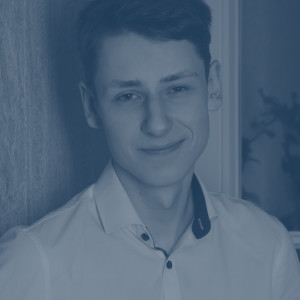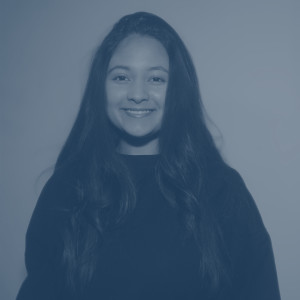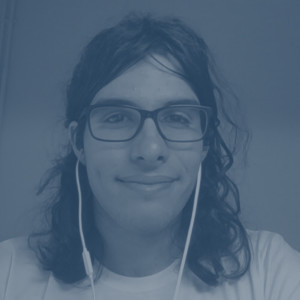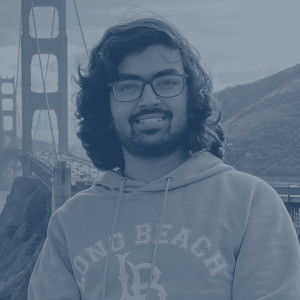Karan Luthria, 20
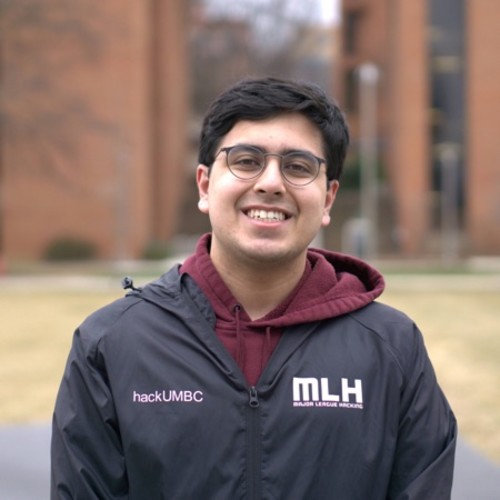
Helping others is a passion of Karan’s, whether through community clean-ups as an Eagle Scout or volunteering at the local hospital. In high school, Karan took a number of science courses, hoping to one day become a physician, but this vision shifted when he landed a research position at the Johns Hopkins Applied Physics Lab. He started learning computer science as he developed visualizations for various biological research projects, and his mentor encouraged him to step outside of his comfort zone and develop a computational background. He suggested that Karan attend his first hackathon, Bitcamp Spring 2017, with just a basic knowledge of Java and Javascript.
Walking into the Xfinity Center and seeing college students with boxes of electronics and monitors was quite intimidating at first. The hackathon began with a keynote speech by Brendan Iribe, founder of Oculus, and Karan learned that they had attended the same high school. Connecting with a billionaire and being inspired by his story of starting college with no programming experience helped Karan quell his nervousness and find the motivation to network with company representatives and attendees. During a Node.js workshop, Karan met and formed a team with three college freshmen, and in no time, ideas were flying, code was written, and a product was developed. They created LifeOK, an application that lets patients share diary entries with their physicians so that they can better understand the patients and provide better health care treatment. Learning how to code, build websites, and work with complete strangers all within 36 hours was an amazing experience, and he is extremely grateful to be able to help other hackers have that same experience in his current role as a hackUMBC organizer.
It only took a few hackathons for Karan to notice the underrepresentation of minority groups in the community among organizers, sponsors, and hackers. Despite increased diversity in scientific fields in recent years, there is still much work to be done as only 14% of recent computer science majors are from Black/Latinx backgrounds, and only 20% of computer science graduates are female. Karan wants to help fight such disparities in the hackathon community and did so through his work at hackUMBC. Since joining his freshman year, Karan helped raise over $20,000 from newly recruited sponsors, built a judging application with the tech team, and pitched events around campus. Organizing events let him share his own experiences with those from underrepresented backgrounds and draw more diverse attendees, and as Karan took on more responsibilities, he eventually became a director of hackUMBC. As director, his goal was to promote representation and diversity in the tech community, and he did so by partnering with various organizations. Karan is a Meyerhoff Scholar at UMBC, connecting him with an organization dedicated to increasing academic diversity by helping underrepresented populations succeed in science. Last year he worked with the CEO and Founder of Technovation, Tara Chklovski, an international non-profit organization that promotes women to enter the computer science field. With hackUMBC 2020 going virtual, Chklovski promoted the event to Technovation alumni, and the event saw a record high of female attendance at nearly 40%. While there is still much to be accomplished, Karan is doing his best to take steps in the right direction.
As computer science grows to be a more integral part of everyday life, Karan reminds us that it is important to understand the repercussions it may have on others and our world. Studies show that technology exacerbates many of the inequalities in America, and such inequities have been highlighted by the pandemic as many people are not able to work remotely without easy access to technology. Karan hopes to make technology more available and beneficial for those who most need it, and his local work helping around Baltimore not only excites him about becoming a physician, but has helped him find a way to make a difference. At hackathons, Karan can not only test new technologies or develop fun games, but work on products that will help those around us. Computer science provides a pathway for anyone to become successful regardless of their background with powerful tools at our fingertips, and by organizing hackUMBC events and mentoring at middle- and elementary schools, Karan stays connected to his roots so that he can inspire others to find their own means of impact.
Karan has come a long way since learning his first web application at Bitcamp 2017, and he attributes all of his technical skills to various teammates and mentors at every hackathon he attended. Whether sitting next to Google Cloud sponsors to learn Firebase and Android development at PennApps, learning basic machine learning models like SVMs and Random Forest Algorithms from mentors at HackRU 2019, or having an MLH Coach teach him Twilio’s API, Karan found the help provided at hackathons invaluable in developing his skills. His career trajectory has also taken a drastic turn since 2017, thanks to the hacker community that helped him find a new passion, unlock new opportunities, and help people in unique ways through computer science.
He currently works in a computational biology research lab at his university, where he develops tools to help predict drug repurposing targets, leading to faster and safer therapeutics. He has even proposed how such work could be used to help solve the COVID-19 pandemic. Karan has presented this work at conferences in San Diego, Washington D.C., and Los Angeles. His efforts led to a nomination as a finalist for the ACM Student Research Competition by Microsoft, and even earned him the prestigious Goldwater Scholarship out of over 5,000 STEM students nominated for the award. Goldwater Scholars are selected based on their contributions and recognitions in research, with many being published authors and having presented research at conferences. Karan will soon be inducted into the prestigious community of previous winners and esteemed professors.
Last summer, Karan interned at Harvard Medical School, using his website development skills to create an interactive visualization tool that calculates and communicates the potential complications of a surgical operation, while collaborating with physicians, data scientists, and researchers. Seeing his creation used to help people in a clinic will always be a dream of his, and hackathons have made it possible for him to have a potentially wide-reaching impact in the field of healthcare. This summer, Karan will be working with the Technology and Translational Research Unit at the National Institute on Drug Abuse, to investigate the impact of the pandemic on trends in substance use, and mental health across the nation through analyzing Qualtrics surveys and social media trends.
Karan’s work in the medical lab also carried over to many projects he developed at hackathons, such as a machine learning algorithm that detects one-sided facial weakness to predict if a patient is experiencing a stroke at Bitcamp 2019, and PictoPill, an AR app that uses NLP to identify important details from a pill’s barcode and help patients schedule prescription drugs at PennApps. He never expected that attending one hackathon could snowball into fluency in many languages and frameworks, winning various research competitions, or an internship at Harvard, and the more he works with new computational technologies, builds projects, and meets new people at hackathons, the closer he comes towards his career goals.
Karan built his favorite hackathon project Hungry Hungry Santa during HolidayHacks 2020. During the pandemic, many local restaurants and businesses were significantly impacted. With many restaurants being forced to shut down, and foodies, such as Karan, missing their food, the idea for Hungry Hungry Santa came to him. Using Google Cloud to train a population prediction algorithm and a Python web-crawler, the web application has two goals: to help people find their favorite food while remaining safe and socially distanced, and to bring cheer to local restaurant owners affected during the pandemic. Building a project at a virtual hackathon was not as exciting as working in person, but seeing a project from idea to something complete that helps spread joy and positivity (and food) is what he loves most about hackathons. Working on the project kept Karan busy during a quarantine-Christmas weekend, and helped him end a rough year on a happy note. Winning second place at the event was only a cherry on top.
Karan plans on matriculating into an MD-PhD program centered around computational biology. As a physician-scientist with an MD-PhD, he will be able to develop novel technologies to be implemented in clinical settings. The medical degree will give him a better grasp on the various problems that lead to healthcare disparities and inaccessible treatments, and the Ph.D. training will help him develop, test, and share computational solutions with the rest of the research community. Hackathons have always been a big part of Karan’s research experience, and they will continue to help him as he achieves his career goals.
Quick Facts
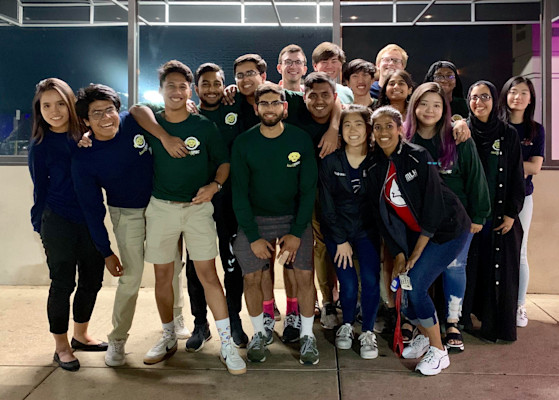
Karan Luthria, 20

Helping others is a passion of Karan’s, whether through community clean-ups as an Eagle Scout or volunteering at the local hospital. In high school, Karan took a number of science courses, hoping to one day become a physician, but this vision shifted when he landed a research position at the Johns Hopkins Applied Physics Lab. He started learning computer science as he developed visualizations for various biological research projects, and his mentor encouraged him to step outside of his comfort zone and develop a computational background. He suggested that Karan attend his first hackathon, Bitcamp Spring 2017, with just a basic knowledge of Java and Javascript.
Walking into the Xfinity Center and seeing college students with boxes of electronics and monitors was quite intimidating at first. The hackathon began with a keynote speech by Brendan Iribe, founder of Oculus, and Karan learned that they had attended the same high school. Connecting with a billionaire and being inspired by his story of starting college with no programming experience helped Karan quell his nervousness and find the motivation to network with company representatives and attendees. During a Node.js workshop, Karan met and formed a team with three college freshmen, and in no time, ideas were flying, code was written, and a product was developed. They created LifeOK, an application that lets patients share diary entries with their physicians so that they can better understand the patients and provide better health care treatment. Learning how to code, build websites, and work with complete strangers all within 36 hours was an amazing experience, and he is extremely grateful to be able to help other hackers have that same experience in his current role as a hackUMBC organizer.
It only took a few hackathons for Karan to notice the underrepresentation of minority groups in the community among organizers, sponsors, and hackers. Despite increased diversity in scientific fields in recent years, there is still much work to be done as only 14% of recent computer science majors are from Black/Latinx backgrounds, and only 20% of computer science graduates are female. Karan wants to help fight such disparities in the hackathon community and did so through his work at hackUMBC. Since joining his freshman year, Karan helped raise over $20,000 from newly recruited sponsors, built a judging application with the tech team, and pitched events around campus. Organizing events let him share his own experiences with those from underrepresented backgrounds and draw more diverse attendees, and as Karan took on more responsibilities, he eventually became a director of hackUMBC. As director, his goal was to promote representation and diversity in the tech community, and he did so by partnering with various organizations. Karan is a Meyerhoff Scholar at UMBC, connecting him with an organization dedicated to increasing academic diversity by helping underrepresented populations succeed in science. Last year he worked with the CEO and Founder of Technovation, Tara Chklovski, an international non-profit organization that promotes women to enter the computer science field. With hackUMBC 2020 going virtual, Chklovski promoted the event to Technovation alumni, and the event saw a record high of female attendance at nearly 40%. While there is still much to be accomplished, Karan is doing his best to take steps in the right direction.
As computer science grows to be a more integral part of everyday life, Karan reminds us that it is important to understand the repercussions it may have on others and our world. Studies show that technology exacerbates many of the inequalities in America, and such inequities have been highlighted by the pandemic as many people are not able to work remotely without easy access to technology. Karan hopes to make technology more available and beneficial for those who most need it, and his local work helping around Baltimore not only excites him about becoming a physician, but has helped him find a way to make a difference. At hackathons, Karan can not only test new technologies or develop fun games, but work on products that will help those around us. Computer science provides a pathway for anyone to become successful regardless of their background with powerful tools at our fingertips, and by organizing hackUMBC events and mentoring at middle- and elementary schools, Karan stays connected to his roots so that he can inspire others to find their own means of impact.
Karan has come a long way since learning his first web application at Bitcamp 2017, and he attributes all of his technical skills to various teammates and mentors at every hackathon he attended. Whether sitting next to Google Cloud sponsors to learn Firebase and Android development at PennApps, learning basic machine learning models like SVMs and Random Forest Algorithms from mentors at HackRU 2019, or having an MLH Coach teach him Twilio’s API, Karan found the help provided at hackathons invaluable in developing his skills. His career trajectory has also taken a drastic turn since 2017, thanks to the hacker community that helped him find a new passion, unlock new opportunities, and help people in unique ways through computer science.
He currently works in a computational biology research lab at his university, where he develops tools to help predict drug repurposing targets, leading to faster and safer therapeutics. He has even proposed how such work could be used to help solve the COVID-19 pandemic. Karan has presented this work at conferences in San Diego, Washington D.C., and Los Angeles. His efforts led to a nomination as a finalist for the ACM Student Research Competition by Microsoft, and even earned him the prestigious Goldwater Scholarship out of over 5,000 STEM students nominated for the award. Goldwater Scholars are selected based on their contributions and recognitions in research, with many being published authors and having presented research at conferences. Karan will soon be inducted into the prestigious community of previous winners and esteemed professors.
Last summer, Karan interned at Harvard Medical School, using his website development skills to create an interactive visualization tool that calculates and communicates the potential complications of a surgical operation, while collaborating with physicians, data scientists, and researchers. Seeing his creation used to help people in a clinic will always be a dream of his, and hackathons have made it possible for him to have a potentially wide-reaching impact in the field of healthcare. This summer, Karan will be working with the Technology and Translational Research Unit at the National Institute on Drug Abuse, to investigate the impact of the pandemic on trends in substance use, and mental health across the nation through analyzing Qualtrics surveys and social media trends.
Karan’s work in the medical lab also carried over to many projects he developed at hackathons, such as a machine learning algorithm that detects one-sided facial weakness to predict if a patient is experiencing a stroke at Bitcamp 2019, and PictoPill, an AR app that uses NLP to identify important details from a pill’s barcode and help patients schedule prescription drugs at PennApps. He never expected that attending one hackathon could snowball into fluency in many languages and frameworks, winning various research competitions, or an internship at Harvard, and the more he works with new computational technologies, builds projects, and meets new people at hackathons, the closer he comes towards his career goals.
Karan built his favorite hackathon project Hungry Hungry Santa during HolidayHacks 2020. During the pandemic, many local restaurants and businesses were significantly impacted. With many restaurants being forced to shut down, and foodies, such as Karan, missing their food, the idea for Hungry Hungry Santa came to him. Using Google Cloud to train a population prediction algorithm and a Python web-crawler, the web application has two goals: to help people find their favorite food while remaining safe and socially distanced, and to bring cheer to local restaurant owners affected during the pandemic. Building a project at a virtual hackathon was not as exciting as working in person, but seeing a project from idea to something complete that helps spread joy and positivity (and food) is what he loves most about hackathons. Working on the project kept Karan busy during a quarantine-Christmas weekend, and helped him end a rough year on a happy note. Winning second place at the event was only a cherry on top.
Karan plans on matriculating into an MD-PhD program centered around computational biology. As a physician-scientist with an MD-PhD, he will be able to develop novel technologies to be implemented in clinical settings. The medical degree will give him a better grasp on the various problems that lead to healthcare disparities and inaccessible treatments, and the Ph.D. training will help him develop, test, and share computational solutions with the rest of the research community. Hackathons have always been a big part of Karan’s research experience, and they will continue to help him as he achieves his career goals.
Quick Facts

